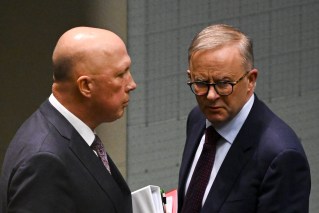Yes case gets a glimmer of hope, but the tide might be turning too late
Support for the Indigenous voice referendum has ticked up for the first time in months, but still lags behind the ‘no’ vote.

Voters and volunteers are seen at Brisbane City Hall, during early voting for the Indigenous voice to parliament referendum in Brisbane, Tuesday, October 3, 2023. (AAP Image/Jono Searle) NO ARCHIVING
The latest Guardian Essential poll found 43 per cent of its 1125 respondents will vote ‘yes’, up two per cent from last fortnight.
But 49 per cent intend to vote ‘no’ and eight per cent are undecided.
Against this backdrop, a concerted effort is being made to engage Australia’s multicultural communities in the referendum.
However, some have reported little to no engagement from either side of the campaign.
The Sydney Alliance, which is made up of more than 40 civil society organisations, is translating referendum material into migrant languages in the city’s west, explaining how to vote.
The alliance is also tapping into the feelings of disempowerment to explain why an Indigenous advisory body is needed in the constitution, Chantelle Ogilvie-Ellis told AAP.
The feedback from the ‘yes’ campaign on the ground in Western Sydney was relatively positive, she said.
“There’s not a lot of acknowledgement of the history of Indigenous people in Australia, so a lot of our conversations are filling in that background,” Ms Ogilvie-Ellis said.
Common themes of support and not feeling heard made migrants receptive to the message, she said.
The Yes23 campaign captain in the outer Melbourne electorate of Lalor said the multicultural community in Victoria’s capital was equally receptive.
The main question from migrant and refugee communities is why such a measure hasn’t already been implemented and First Nations recognised, Emma Moxom said.
“They understand what Indigenous people have been through and they’ve been through things quite similar,” she said.
“Our multicultural community is very open-minded to this message.”
But some second-generation European migrants in inner-city Sydney suburbs, who did not want to be quoted, told AAP they had received almost no engagement from either side outside a letterbox drop.
A number remain sceptical about what the voice could achieve when countless other programs have failed.
Prominent Indigenous ‘no’ campaigners Warren Mundine and Senator Jacinta Nampijinpa Price have called the voice divisive and said it would split Australia down racial lines.
“It doesn’t matter whether we were here 60,000 years ago, or six months ago, you are Australian … and the problem with this divisive referendum is the fact that it seeks to create different levels of citizenship,” Senator Price said.
It was this messaging that Desis for ‘yes’ – a South Asian-Australian run campaign – was seeking to counter.
Underlying questions from the South Asian community mainly related to whether the voice would make binding decisions or give some special treatment, co-founder Nish Rajo said.
“It’s really easy to spread messages like, ‘if you vote this through people will take your land away or you’re giving special rights to a particular group of people’,” he said,
“This is an advisory body, it’s not a decision-making body, that is why we are working so hard to spread the right information.”
Australians will head to the ballot box on October 14 but early voting has begun.












